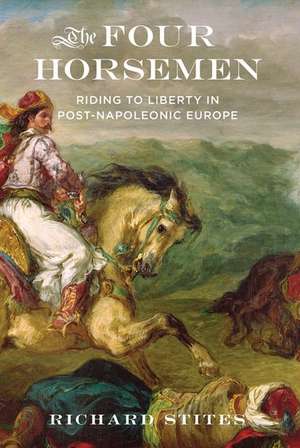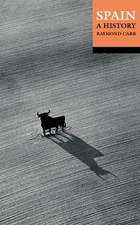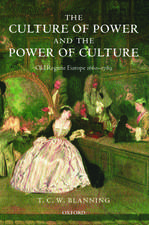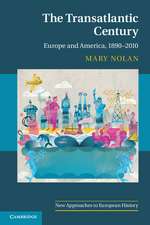The Four Horsemen: Riding to Liberty in Post-Napoleonic Europe
Autor Richard Stitesen Limba Engleză Paperback – 17 sep 2020
| Toate formatele și edițiile | Preț | Express |
|---|---|---|
| Paperback (1) | 191.61 lei 10-16 zile | +53.58 lei 7-11 zile |
| Oxford University Press – 17 sep 2020 | 191.61 lei 10-16 zile | +53.58 lei 7-11 zile |
| Hardback (1) | 346.62 lei 31-37 zile | |
| Oxford University Press – 24 apr 2014 | 346.62 lei 31-37 zile |
Preț: 191.61 lei
Preț vechi: 212.93 lei
-10% Nou
Puncte Express: 287
Preț estimativ în valută:
36.67€ • 38.41$ • 30.39£
36.67€ • 38.41$ • 30.39£
Carte disponibilă
Livrare economică 07-13 martie
Livrare express 04-08 martie pentru 63.57 lei
Preluare comenzi: 021 569.72.76
Specificații
ISBN-13: 9780197533581
ISBN-10: 0197533582
Pagini: 456
Dimensiuni: 231 x 155 x 28 mm
Greutate: 0.84 kg
Editura: Oxford University Press
Colecția OUP USA
Locul publicării:New York, United States
ISBN-10: 0197533582
Pagini: 456
Dimensiuni: 231 x 155 x 28 mm
Greutate: 0.84 kg
Editura: Oxford University Press
Colecția OUP USA
Locul publicării:New York, United States
Recenzii
Beautifully written, dramatic, and filled with life, The Four Horsemen is a tribute to the peoples and ideas that it champions....The Four Horsemen provides an original narrative of four particular upheavals that presaged the transition of governments from monarchies to constitutional regimes and nations-states....The Four Horsemen is transnational history at its finest.
Based on primary sources from all four countries, this deeply researched narrative blossoms into a true transnational history, illustrating the interconnection of these revolts....A tour de force that deftly tells an important story in engrossing detail.
Published posthumously, Stites's final work is both a career-defining accomplishment and something of a departure. The preeminent European historian broadens his focus from Russia and popular culture to encompass the entire continent and the spread of democracy, revolution, and self-determination.
The Four Horsemen is a highly original and important study of revolutionary movements in early nineteenth century Europe. With a strong cast of extraordinary characters, it is also a tremendous read.
This is a beautiful book, covering a period that is chronically understudied, and doing so with great richness and subtlety, in a way that no one to my knowledge has ever done. Stites was a historian primarily of Russia, and yet his knowledge of developments across Europe was impressive. In his deft handling, a line of continuity running from Spain to Italy to Greece to Russia is exposed with incredible clarity, revealing the close connections between the disparate liberal revolutions of the 1820s, and their broader resonance throughout Europe. Stites wrote like the historian of my mind's eye: learned, wise, kindly, and humane, sensitive to life's great openings as well as to its tragic closures.
Richard Stites's astute and engagingly written book helps to recover the importance of these men [four remarkable, if unlikely, rebels] and their lost causes, both for their time as well as ours. They formed a subterranean liberal international, creating far-flung networks to resist tyranny. They believed that toppling a despot in a single country would reverberate across Europe. For them, the fate of Spain was entwined with the fate of Russia. It was not accidental that many refugees from failed revolutions in Spain, Naples, and Russia later converged on Greece and died there in the cause of independence. Together they forged a primordial European identity that survived their own anclimactic ends in exile, in dungeons, or on the scaffold.
Single-handedly, this study revisits one of the most neglected episodes of European history: namely the failed liberal and constitutional revolutions of the 1820s. With the enviable nimbleness of someone who has mastered the art of story-telling, and no fewer than a dozen European languages, Stites interweaves seamlessly the story of three very different Southern European Revolutions (together with the Decembrist Revolt) into a highly original and exquisitely written study...Each chapter is written in a gripping and page-turning fashion, with oddly apposite moments of dry humour, which will undoubtedly make this book both a classic and an essential item on any undergraduate reading list exploring the age of revolutions...Hopefully more scholars will follow the path opened by Stites's accessible and elegantly written study. The four horsemen remain vanquished but, thanks to this book, they will not be forgotten.
Based on primary sources from all four countries, this deeply researched narrative blossoms into a true transnational history, illustrating the interconnection of these revolts....A tour de force that deftly tells an important story in engrossing detail.
Published posthumously, Stites's final work is both a career-defining accomplishment and something of a departure. The preeminent European historian broadens his focus from Russia and popular culture to encompass the entire continent and the spread of democracy, revolution, and self-determination.
The Four Horsemen is a highly original and important study of revolutionary movements in early nineteenth century Europe. With a strong cast of extraordinary characters, it is also a tremendous read.
This is a beautiful book, covering a period that is chronically understudied, and doing so with great richness and subtlety, in a way that no one to my knowledge has ever done. Stites was a historian primarily of Russia, and yet his knowledge of developments across Europe was impressive. In his deft handling, a line of continuity running from Spain to Italy to Greece to Russia is exposed with incredible clarity, revealing the close connections between the disparate liberal revolutions of the 1820s, and their broader resonance throughout Europe. Stites wrote like the historian of my mind's eye: learned, wise, kindly, and humane, sensitive to life's great openings as well as to its tragic closures.
Richard Stites's astute and engagingly written book helps to recover the importance of these men [four remarkable, if unlikely, rebels] and their lost causes, both for their time as well as ours. They formed a subterranean liberal international, creating far-flung networks to resist tyranny. They believed that toppling a despot in a single country would reverberate across Europe. For them, the fate of Spain was entwined with the fate of Russia. It was not accidental that many refugees from failed revolutions in Spain, Naples, and Russia later converged on Greece and died there in the cause of independence. Together they forged a primordial European identity that survived their own anclimactic ends in exile, in dungeons, or on the scaffold.
Single-handedly, this study revisits one of the most neglected episodes of European history: namely the failed liberal and constitutional revolutions of the 1820s. With the enviable nimbleness of someone who has mastered the art of story-telling, and no fewer than a dozen European languages, Stites interweaves seamlessly the story of three very different Southern European Revolutions (together with the Decembrist Revolt) into a highly original and exquisitely written study...Each chapter is written in a gripping and page-turning fashion, with oddly apposite moments of dry humour, which will undoubtedly make this book both a classic and an essential item on any undergraduate reading list exploring the age of revolutions...Hopefully more scholars will follow the path opened by Stites's accessible and elegantly written study. The four horsemen remain vanquished but, thanks to this book, they will not be forgotten.
Notă biografică
Richard Stites was Professor of History at Georgetown University. A groundbreaking historian who opened up new territory with landmark works on the Russian women's movement and on Russian and Soviet mass culture, he was the author of Revolutionary Dreams: Utopian Vision and Experimental Life in the Russian Revolution and Serfdom, Society, and the Arts in Imperial Russia: The Pleasure and the Power and the co-author of A History of Russia: Peoples, Legends, Events, Forces.













